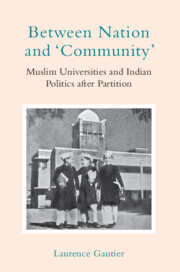
- Publisher:
- Cambridge University Press
- Online publication date:
- April 2024
- Print publication year:
- 2025
- Online ISBN:
- 9781009358507


This book proposes a political history of Muslim universities in post-independence India, from 1947 to the 1990s. Based on a wide range of sources in English and in Urdu, it highlights the central role that these educational institutions played in the debates on national integration, secularism, minority rights and Muslim backwardness. After independence, Muslim universities found themselves at a critical juncture between central state authorities and India's Muslim population. As public and Muslim institutions, they were to participate in nation-building as much as in the development of the Muslim 'community'. By closely looking at the relation between these institutions and state authorities, the book teases out the ambiguities of the state's Muslim policy. It also examines, in turn, how university members responded to this policy and developed competing conceptions of Muslim identity and citizenship, which structured the wider public debates on Muslims' status in post-partition India.
‘As India's rich diversity of cultures faces the challenges of nationalist uniformity and authoritarian governance, Aligarh Muslim University and the Jamia Millia Islamia have shown that pluralism and difference are the essence of democracy. Laurence Gautier combines thorough research with insightful analysis to argue that Muslims in all their variety are indeed active citizens of India and constituents of India’s historic civilization.’
David Lelyveld - author of Aligarh’s First generation
‘This book presents the first scholarly monograph on the history of Jamia Millia Islamia and Aligarh Muslim University after Independence. In an innovative reading, this history of the two universities is less focused on a history of education in the narrow sense but opens up to a political history. Both the Jamia and Aligarh were central to the political debates on the future of Muslims in India. In a masterly interpretation, Laurence Gautier brings together the multiple debates within the universities, their navigation ‘Between Nation and Community,’ and the ways they were perceived and used by different state actors. A must-read for everyone interested in the history, but even more so in the present of Muslims in India.’
Margrit Pernau - author of Emotions and Modernity in Colonial India
‘Between Nation and Community is one of the most comprehensive and profound interventions in the study of Muslim communities in the first fifty years of India’s republican journey. Laurence Gautier brings out the politics of various communities and classes of Muslims in their efforts towards the ‘pluralization’ of India’s democratic politics. Gautier busts many a myth regarding Indian Muslims in both the progressive as well as majoritarian narratives by using a wide range of untapped primary sources in English and in Urdu. Empirically rich, analytically sharp, articulated in lucid prose, this book is an enjoyable read. It is intellectually edifying, particularly for those interested in minority rights, student and youth movements and gender studies. This book is undoubtedly one of its own kind and promises a very long shelf-life.’
Mohammad Sajjad - author of Muslim politics in Bihar
‘Between Nation and ‘Community’ provides an important new interpretation of the history of Muslim universities and Muslim politics in postcolonial North India. Based on rich archival materials in English and Urdu, the book rejects the overly simplistic analysis of much of the scholarship on Aligarh Muslim University and Jamia Millia Islamia. Instead, this research unearths the many complexities, tensions and debates within these universities and in India's Muslim communities as they coped with the aftermath of partition, the rise of Mandal politics and the emergence of Hindutva as a political force. It is sure to become essential reading for anyone wishing to understand the second half of the twentieth century in India.’
Taylor C. Sherman - author of Nehru's India: A History in Seven Myths
 Loading metrics...
Loading metrics...
* Views captured on Cambridge Core between #date#. This data will be updated every 24 hours.
Usage data cannot currently be displayed.